外研版(2019)必修三 Unit2 Making a difference Developing ideas 课件(共60张PPT)
文档属性
| 名称 | 外研版(2019)必修三 Unit2 Making a difference Developing ideas 课件(共60张PPT) | 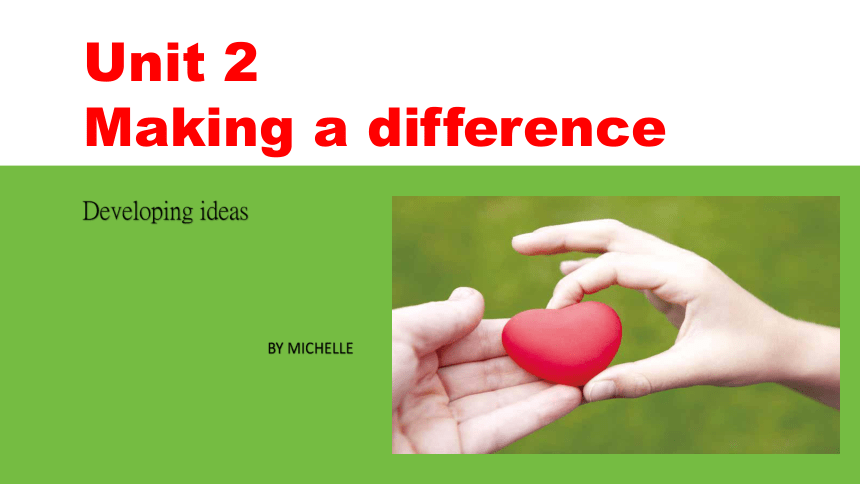 | |
| 格式 | pptx | ||
| 文件大小 | 72.9MB | ||
| 资源类型 | 教案 | ||
| 版本资源 | 外研版(2019) | ||
| 科目 | 英语 | ||
| 更新时间 | 2025-01-10 15:05:17 | ||
图片预览

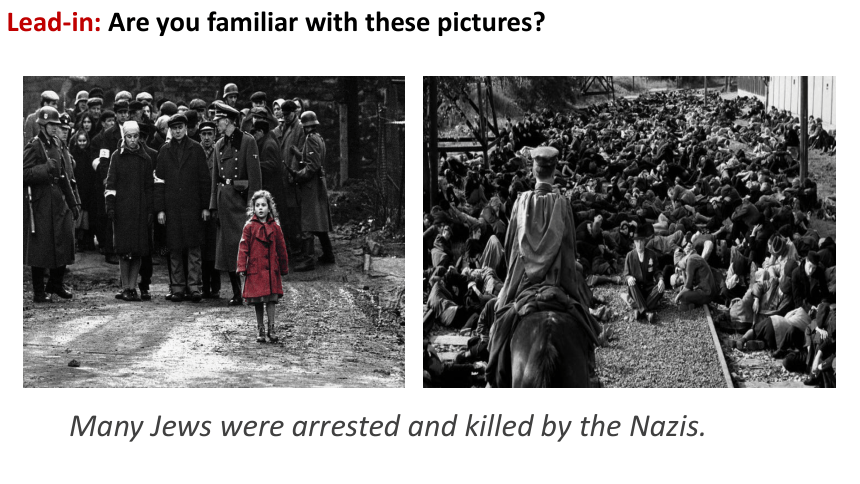
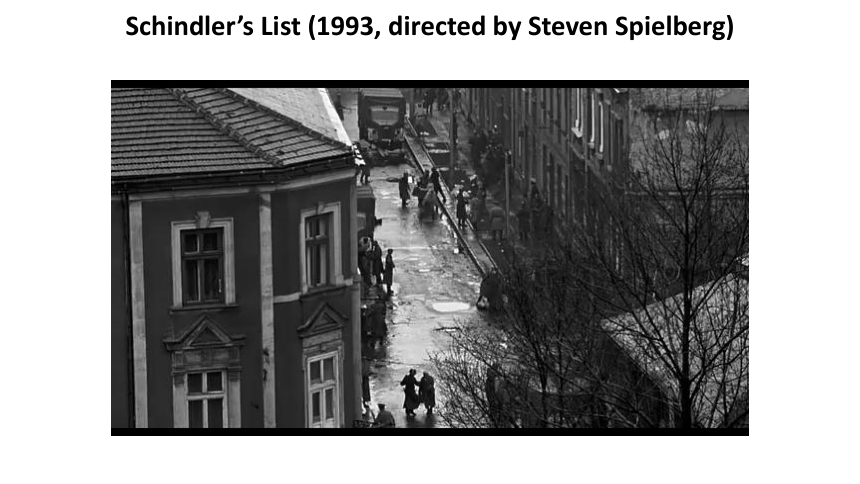
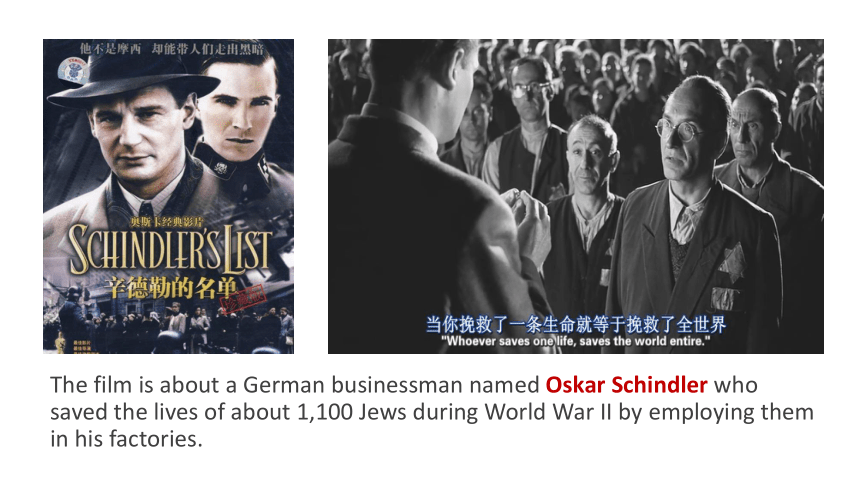
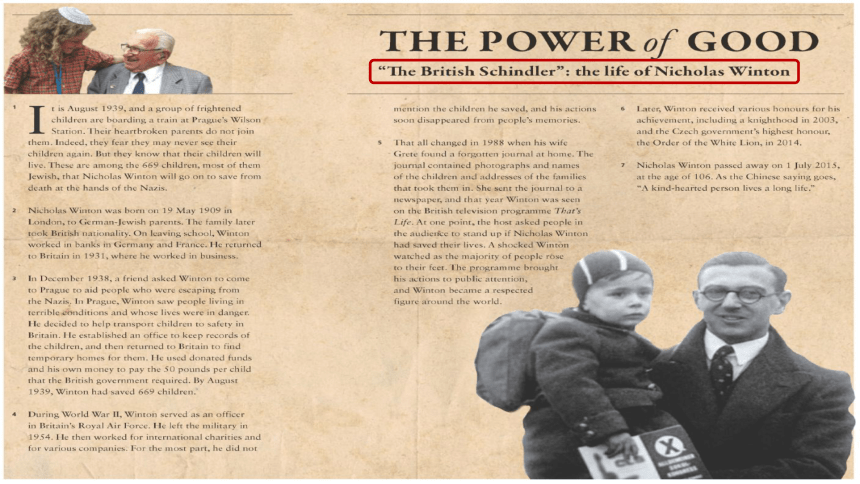
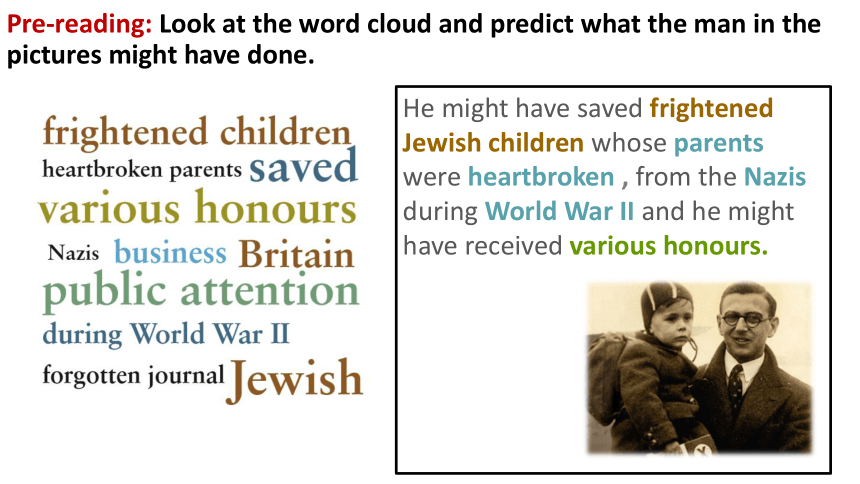
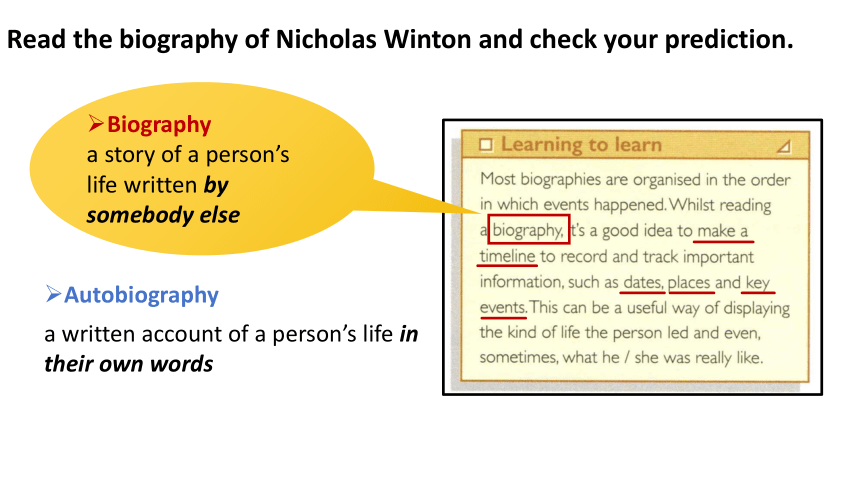
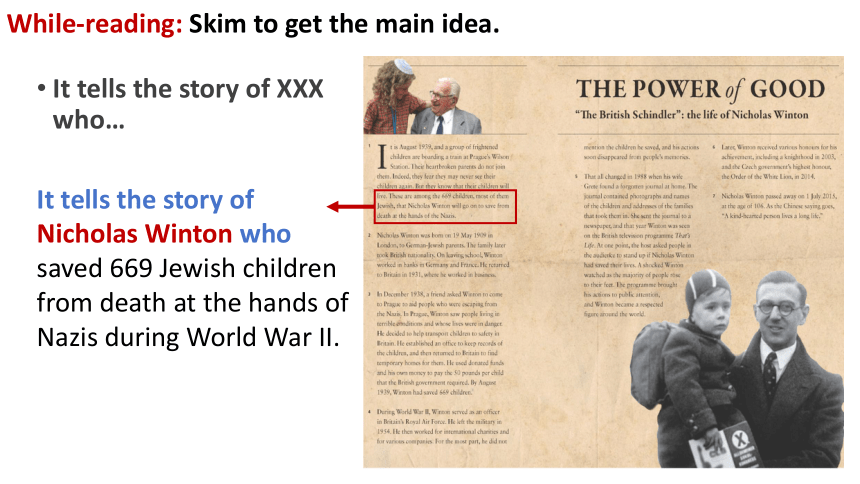
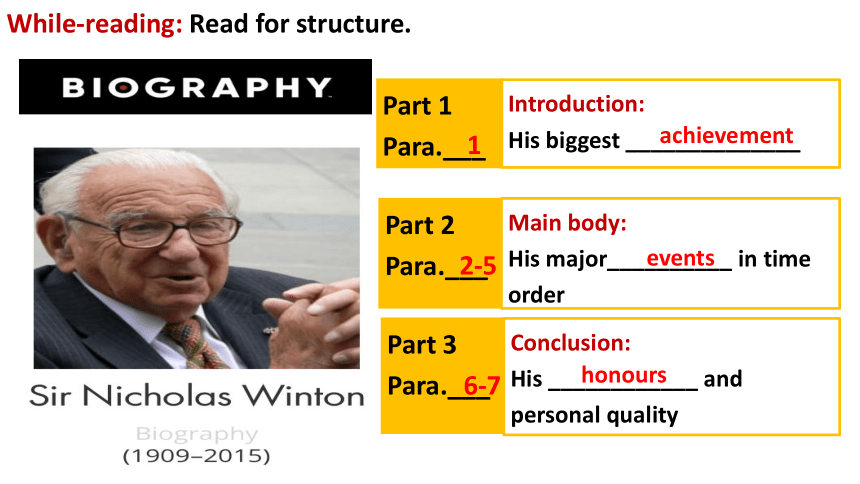
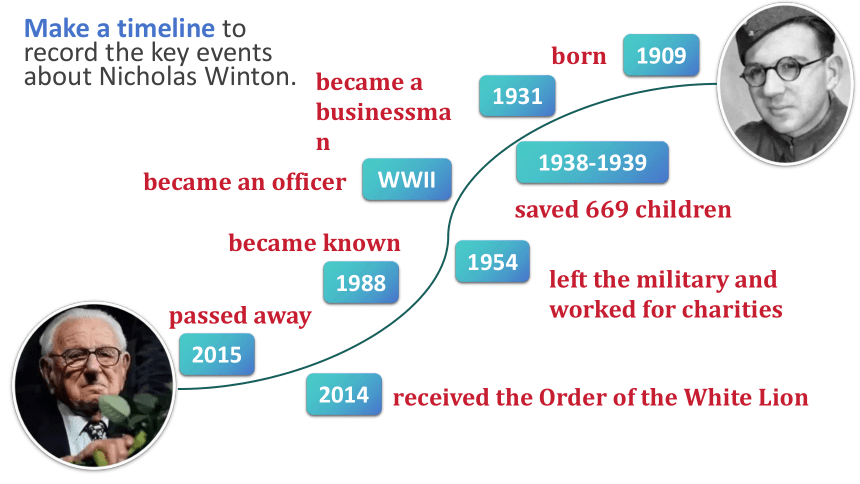
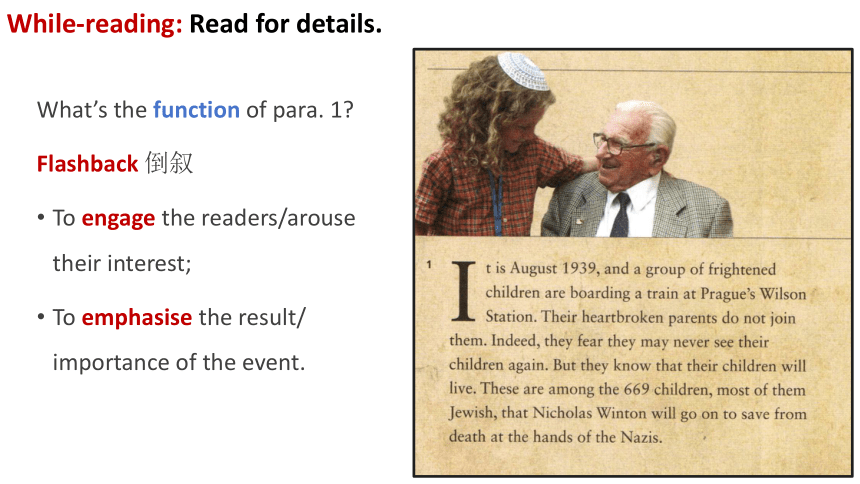
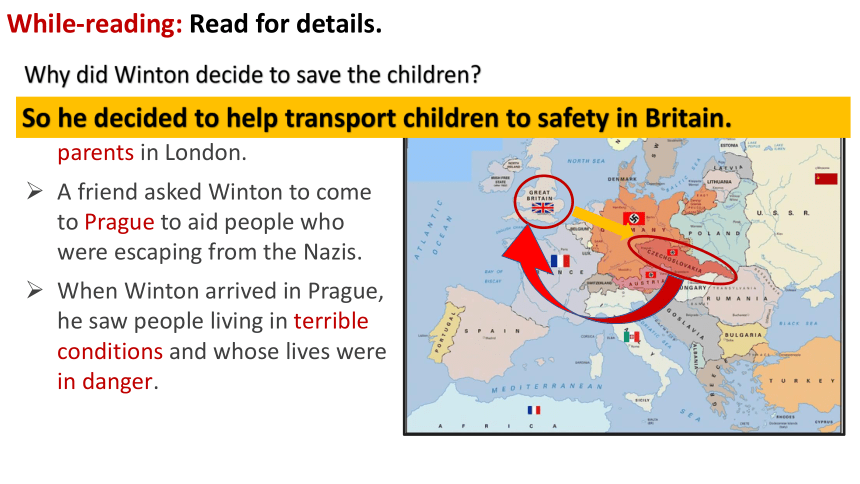
文档简介
(共60张PPT)
Unit 2
Making a difference
Developing ideas
BY MICHELLE
Lead-in: Are you familiar with these pictures
Many Jews were arrested and killed by the Nazis.
Schindler’s List (1993, directed by Steven Spielberg)
The film is about a German businessman named Oskar Schindler who saved the lives of about 1,100 Jews during World War II by employing them in his factories.
He might have saved frightened Jewish children whose parents were heartbroken , from the Nazis during World War II and he might have received various honours.
Pre-reading: Look at the word cloud and predict what the man in the pictures might have done.
Read the biography of Nicholas Winton and check your prediction.
Biography
a story of a person’s life written by somebody else
Autobiography
a written account of a person’s life in their own words
While-reading: Skim to get the main idea.
It tells the story of XXX who…
It tells the story of Nicholas Winton who saved 669 Jewish children from death at the hands of Nazis during World War II.
While-reading: Read for structure.
Part 1
Para.___
Part 2
Para.___
Part 3
Para.___
Introduction:
His biggest ______________
Main body:
His major__________ in time order
Conclusion:
His ____________ and personal quality
1
2-5
6-7
achievement
events
honours
Make a timeline to record the key events about Nicholas Winton.
1988
1909
1938-1939
2014
2015
WWII
1954
saved 669 children
became known
became an officer
left the military and worked for charities
born
received the Order of the White Lion
passed away
1931
became a businessman
While-reading: Read for details.
What’s the function of para. 1
Flashback 倒叙
To engage the readers/arouse their interest;
To emphasise the result/ importance of the event.
While-reading: Read for details.
Why did Winton decide to save the children
He was born to German-Jewish parents in London.
A friend asked Winton to come to Prague to aid people who were escaping from the Nazis.
When Winton arrived in Prague, he saw people living in terrible conditions and whose lives were in danger.
So he decided to help transport children to safety in Britain.
A child saved by Winton talks about the then situation.
What preparations did he do to save those children
establish an office to keep records of the children
find those children temporary homes
raise money
get permits from the government
arrange train
While-reading: Read for details.
Nicholas Winton talks about the saving.
While-reading: Read for details.
How were Winton's actions known to the public
His wife found a forgotten journal.
She sent the journal to a newspaper.
The programme brought his actions to public attention.
Winton’s children|BBC
Why do you think it took such a long time for Winton’s actions to become known
1988
1938-1939
saved 669 children
became known
50 years
He didn’t mention the children he saved for 50 years.
modest/ selfless
While-reading: Read for details.
Winton received various__________for his ____________.
honours
achievement
Order of the White Lion – The highest honour in Czech
Your life is unusual for various reasons, but you never think you are a hero. Your actions have set good examples of humanitarian spirit (人道主义精神), altruism (利他主义) and modesty.
The Czech President
humanitarian
/hju: m n te ri n/
altruism
/ ltru z m/
Summary
What is the power of good
669 children
saved
others
self
society
being
respected & remembered
On building a Human Community with a Shared Future.
[U] n. behaviour that is morally right or acceptable.合乎道德的行为;正直的行为;善行
Post-reading: Think & Share
Why did the parents fear that they would never see their children again
Because they were Jewish and under the control of the Nazis.
Post-reading: Think & Share
Why do you think it took such a long time for Winton’s actions to become known
Because, for the most part, Winton did not mention the children he saved. Winton might have thought that it was normal to help others when they were in trouble, so it
was not worth mentioning.
Post-reading: Think & Share
Which three words would you use to describe Winton’s personal qualities
selfless
kind-hearted
warm-hearted
brave
generous
modest
He does make a difference to the world.
Post-reading: Think & Share
Do you know of any Chinese who have acted in a similar way to Winton Share their stories with the class.
During the World War II, Ho Fengshan (何凤山; 1901 – 1997), China’s consul general in Vienna, granted thousands of Jews visas to travel to Shanghai to protect them from the Nazis.
Ho Feng-Shan: The Chinese "Schindler"
Post-reading: Work in groups. Give a talk in honour of Nicholas Winton.
Use the table to help plan your talk.
Key actions Personal qualities
He went to Prague to help refugees escape from the Nazis.
Winton worked for international charities and for various companies after he left the military.
...
brave,
warm-hearted,
generous,
selfless,
...
Post-reading: Work in groups. Give a talk in honour of Nicholas Winton.
Organise your talk following the steps below.
Say who you are going to talk about.
Talk about his key actions.
Talk about his personal qualities.
End with the main reasons why he inspires you.
Give your talk to the class.
Language points
It is August 1939, and a group of frightened children are boarding a train at Prague’s Wilson Station.
上火车
broad adj.
aboard prep. /adv.
abroad adv.
broaden one’s views/horizons
go abroad/ at home and abroad
Language points
These are among the 669 children, most of them Jewish, that Nicholas Winton will go on to save from death at the hands of the Nazis.
独立主格结构
定从
go on to do sth. 继续做某事
go on with sth. 继续某事
save from 从...中救出,使免遭
at the hand(s) of 在...手上
独立主格结构的逻辑主语与主句的主语不一致,它独立存在。该结构在句中一般作状语,表示时间、条件、原因、伴随状况等。
独立主格(逻辑主语--n./pron.)结构的常用形式
逻辑主语+现在分词(表主动)
逻辑主语+过去分词(表被动)
逻辑主语+动词不定式(表将来)
逻辑主语+形容词/副词/名词/介词短语(表状态)
Examples
The guide leading the way, we had no trouble getting out of the forest. 导游带路,我们很容易出了森林。
The manager looks relaxed, many things settled. 许多事都解决了,经理看起来很放松。
Such an able man to help you, you will surely succeed sooner or later. 这么一个有能力的人帮你,迟早你会成功的。
Language points
The family later took British nationality. On leaving school, Winton worked in banks in Germany and France. He returned to Britain in 1931, where he worked in business.
取得英国国籍
非限定从
Translation
一家人后来加入了英国国籍。从学校毕业后,温顿先后在德国和法国的银行工作。他于1931年回到英国,从事商业工作。
Language points
In December 1938, a friend asked Winton to come to Prague to aid people who were escaping from the Nazis.
定从
◆aid v./n. 帮助,援助,资助
aid sb. in (doing) sth. 在(做)某事方面帮助某人
aid sb. with sth. 以/用某物帮助某人
aid sb. to do sth. 帮助某人做某事
first aid 急救
with the aid/ help/ assistance of 在...的帮助下
◆escape (doing) sth. 逃避(做)某事
◆escape from (doing) sth. 从(做)某事逃脱
Language points
In Prague, Winton saw people living in terrible conditions and whose lives were in danger. He decided to help transport children to safety in Britain.
后置定语
定从
be in danger 处于危险中
transport ... to ... 将... 运到...
Translation
在布拉格,温顿看到人们生活在恶劣的环境中,连生命都受到威胁。他决定帮助把孩子转移到英国安全的地方。
Language points
He established an office to keep records of the children, and then returned to Britain to find temporary homes for them.
keep records of 记录
◆record v.记录; 记载; 录制; 录(音); 录(像)
n. 记载; 唱片; (尤指体育运动的)纪录
temporary adj. 短暂的; 暂时的; 临时的
n. 临时工; 临时雇员
permanent adj. 永久的; 永恒的; 长久的
Language points
He used donated funds and his own money to pay the 50 pounds per child that the British government required. By August 1939, Winton had saved 669 children.
前置定语
定从
Translation
他用捐款和自己的钱来支付英国政府向每个孩子征收的50英镑的费用。截至1939年8月,温顿已经解救了669个孩子。
Language points
During World War II, Winton served as an officer in Britain’s Royal Air Force. He left the military in 1954. He then worked for international charities and for various companies.
serve as 用作,充当
military adj. 军事的; 军队的; 武装的
n. 军人; 军队; 军方
charity n. 慈善机构(或组织); 慈善; 赈济; 施舍; 仁爱
Translation
二战期间,温顿曾在英国皇家空军担任军官。他于1954年离开部队。之后他在一些国际慈善机构和多家公司工作过。
Language points
For the most part, he did not mention the children he saved, and his actions soon disappeared from people’s memories.
省略who/that的定从
for the most of part 在很大程度上
Translation
他极少提及自己救孩子的事情,于是这些事渐渐淡出了人们的记忆。
Language points
The journal contained photographs and names of the children and addresses of the families that took them in.
收留,吸收
take down/ off/ on/ over/ after/ up
Translation
日记里夹着孩子们的照片,上面记录着孩子们的名字以及寄养家庭的地址。
Language points
At one point, the host asked people in the audience to stand up if Nicholas Winton had saved their lives.
at one point 曾经,在某一时刻
save one’s life (lives) 拯救某人的生命
A shocked Winton watched as the majority of people rose to their feet.
“当...时”,时间状从
rise to their feet 站起身来
◆as的用法
Language points
Examples
Language points
The programme brought his actions to public attention, and Winton became a respected figure around the world.
bring ... to public attention 使...引起某人的注意
◆figure v. 计算,认为 figure out 弄清楚,计算出
n.画像,人/动物,身材,数字,图/表,雕像
Translation
这个节目让他的善举为公众所了解,也让温顿被世界各地的人们所尊敬。
Language points
Later, Winton received various honours for his achievement, including a knighthood in 2003, and the Czech government’s highest honour, the Order of the White Lion, in 2014.
make an achievement/achievements in 在……方面取得成就
Translation
此后,温顿因其成就而获得了各种荣誉,其中包括2003年获得爵士称号,以及2014年获得捷克政府的最高荣誉“白狮勋章”。
◆achievement n. 成就,功绩
◆achieve vt.实现(目标/理想等);取得(胜利/成功等)
achieve one's goal/ dream/ success
Language points
Nicholas Winton passed away on 1 July 2015, at the age of 106. As the Chinese saying goes, “A kind-hearted person lives a long life.”
pass away 去世,逝世
at the age of 在...岁时
live a ... life 过...的生活
Translation
尼古拉斯·温顿于2015年7月1日与世长辞,享年106岁。正如中国谚语所说:“仁者长寿。”
非限定从, “正如”
正如谚语所说
Writing a biography
What is biography
A biography, or simply bio, is a detailed description of a person's life.
How to write a biography
1 Introduction
2 Main body
3 Conclusion
structure
一 介绍人物名字及其主要成就
三 写对人物的积极评价
二 按顺序写其主要事件
Read Tu Youyou’s CV and fill in the boxes with the corresponding information.
Tu Youyou: the first Chinese woman to win a Nobel Prize
Introduction
Name of the person: ___________
Her biggest achievement:
______________________________________________________________________________________________________
Tu Youyou
She managed to extract qinghaosu, which is very effective in fighting malaria.
Main Body
Major events (in time order):
(1951-1955) She was learning in ______________________.
(1955-present)She worked in ___________________________________________.
(1969) She was the leader of a research team aiming to _______________________________.
(1972) Her team managed to extract qinghaosu from _____________.
(1986) Her team obtained a _____________________ for qinghaosu.
(2015) She won ____________________________________________.
(2019) She was nominated for “________________________________
____________”.
Beijing Medical College
China Academy of Chinese Medical Sciences
discover a treatment for malaria
a Chinese herb
New Drug Certificate
the Nobel Prize in Physiology or Medicine
The Greatest Person of the 20th
Century
Conclusion
Your opinion on her contributions:
She is admired because she devotes most of her time and energy to ____________________.
medical research
Now write a biography of Tu Youyou. Use the expressions in the box to help you. Do further research if necessary.
Useful expressions
At the age of...
At one point,...
By(year/day/date),...
In (year),...
On (day/date)...
Later...
Finally...
In 2015, for the first time, a Chinese secientist, Tu Youyou, won the Nobel Prize in Physiology or Medicine.
Born in Ningbo, Zhejiang Province on 30 December 1930, Tu Youyou studied at Beijing Medical College(now Peking University Health Science Centre) from 1951 to 1955. Since1955, she has worked at China Academy of Chinese Medical Sciences as a tenured and chief researcher. In 1969, she worked as the leader of a research team aiming to discover a treatment for malaria. By 1972, she had managed to extract qinghaosu from a Chinese herb, which is very effective in fighting malaria.
One possible version:
Fourteen years later, she obtained a New Drug Certificate for qinghaosu, issued by the Ministry of Health of China. Because of her great contribution, she was presented with the Nobel Prize at the age of 85. In 2019, she was also nominated for“The Greatest Person of the 20th Century”.
Not only has she saved many people suffering from malaria, but also she has proved the effectiveness of Chinese herbs. Furthermore, she is admired because she devotes most of her time and energy to medical research.
One possible version:
Presenting ideas
Think of someone you want to recommend as “Person of the Year”.
You can choose a well-known person or someone you know.
Complete the form about the person.
Group work:
Talk about your “Person of the Year” and choose the best one in your group. Use the information in Activity 1 and the expressions in the box to help you.
Useful expressions:
I recommend ... because (of)...
I think ... is the best choice because (of)...
My choice is... This is because...
I agree with...
I think ... is absolutely right (I cannot agree more) because...
I’m afraid that I have to disagree. I think...
Really I don’t think so. I think...
Present your “Person of Year” to class. Use the expressions in the box to help you.
Homework
Review the language points.
Search the Internet to know more about Nicholas Winton.
Write a short passage about him.
THANKS FOR WATCHING
Unit 2
Making a difference
Developing ideas
BY MICHELLE
Lead-in: Are you familiar with these pictures
Many Jews were arrested and killed by the Nazis.
Schindler’s List (1993, directed by Steven Spielberg)
The film is about a German businessman named Oskar Schindler who saved the lives of about 1,100 Jews during World War II by employing them in his factories.
He might have saved frightened Jewish children whose parents were heartbroken , from the Nazis during World War II and he might have received various honours.
Pre-reading: Look at the word cloud and predict what the man in the pictures might have done.
Read the biography of Nicholas Winton and check your prediction.
Biography
a story of a person’s life written by somebody else
Autobiography
a written account of a person’s life in their own words
While-reading: Skim to get the main idea.
It tells the story of XXX who…
It tells the story of Nicholas Winton who saved 669 Jewish children from death at the hands of Nazis during World War II.
While-reading: Read for structure.
Part 1
Para.___
Part 2
Para.___
Part 3
Para.___
Introduction:
His biggest ______________
Main body:
His major__________ in time order
Conclusion:
His ____________ and personal quality
1
2-5
6-7
achievement
events
honours
Make a timeline to record the key events about Nicholas Winton.
1988
1909
1938-1939
2014
2015
WWII
1954
saved 669 children
became known
became an officer
left the military and worked for charities
born
received the Order of the White Lion
passed away
1931
became a businessman
While-reading: Read for details.
What’s the function of para. 1
Flashback 倒叙
To engage the readers/arouse their interest;
To emphasise the result/ importance of the event.
While-reading: Read for details.
Why did Winton decide to save the children
He was born to German-Jewish parents in London.
A friend asked Winton to come to Prague to aid people who were escaping from the Nazis.
When Winton arrived in Prague, he saw people living in terrible conditions and whose lives were in danger.
So he decided to help transport children to safety in Britain.
A child saved by Winton talks about the then situation.
What preparations did he do to save those children
establish an office to keep records of the children
find those children temporary homes
raise money
get permits from the government
arrange train
While-reading: Read for details.
Nicholas Winton talks about the saving.
While-reading: Read for details.
How were Winton's actions known to the public
His wife found a forgotten journal.
She sent the journal to a newspaper.
The programme brought his actions to public attention.
Winton’s children|BBC
Why do you think it took such a long time for Winton’s actions to become known
1988
1938-1939
saved 669 children
became known
50 years
He didn’t mention the children he saved for 50 years.
modest/ selfless
While-reading: Read for details.
Winton received various__________for his ____________.
honours
achievement
Order of the White Lion – The highest honour in Czech
Your life is unusual for various reasons, but you never think you are a hero. Your actions have set good examples of humanitarian spirit (人道主义精神), altruism (利他主义) and modesty.
The Czech President
humanitarian
/hju: m n te ri n/
altruism
/ ltru z m/
Summary
What is the power of good
669 children
saved
others
self
society
being
respected & remembered
On building a Human Community with a Shared Future.
[U] n. behaviour that is morally right or acceptable.合乎道德的行为;正直的行为;善行
Post-reading: Think & Share
Why did the parents fear that they would never see their children again
Because they were Jewish and under the control of the Nazis.
Post-reading: Think & Share
Why do you think it took such a long time for Winton’s actions to become known
Because, for the most part, Winton did not mention the children he saved. Winton might have thought that it was normal to help others when they were in trouble, so it
was not worth mentioning.
Post-reading: Think & Share
Which three words would you use to describe Winton’s personal qualities
selfless
kind-hearted
warm-hearted
brave
generous
modest
He does make a difference to the world.
Post-reading: Think & Share
Do you know of any Chinese who have acted in a similar way to Winton Share their stories with the class.
During the World War II, Ho Fengshan (何凤山; 1901 – 1997), China’s consul general in Vienna, granted thousands of Jews visas to travel to Shanghai to protect them from the Nazis.
Ho Feng-Shan: The Chinese "Schindler"
Post-reading: Work in groups. Give a talk in honour of Nicholas Winton.
Use the table to help plan your talk.
Key actions Personal qualities
He went to Prague to help refugees escape from the Nazis.
Winton worked for international charities and for various companies after he left the military.
...
brave,
warm-hearted,
generous,
selfless,
...
Post-reading: Work in groups. Give a talk in honour of Nicholas Winton.
Organise your talk following the steps below.
Say who you are going to talk about.
Talk about his key actions.
Talk about his personal qualities.
End with the main reasons why he inspires you.
Give your talk to the class.
Language points
It is August 1939, and a group of frightened children are boarding a train at Prague’s Wilson Station.
上火车
broad adj.
aboard prep. /adv.
abroad adv.
broaden one’s views/horizons
go abroad/ at home and abroad
Language points
These are among the 669 children, most of them Jewish, that Nicholas Winton will go on to save from death at the hands of the Nazis.
独立主格结构
定从
go on to do sth. 继续做某事
go on with sth. 继续某事
save from 从...中救出,使免遭
at the hand(s) of 在...手上
独立主格结构的逻辑主语与主句的主语不一致,它独立存在。该结构在句中一般作状语,表示时间、条件、原因、伴随状况等。
独立主格(逻辑主语--n./pron.)结构的常用形式
逻辑主语+现在分词(表主动)
逻辑主语+过去分词(表被动)
逻辑主语+动词不定式(表将来)
逻辑主语+形容词/副词/名词/介词短语(表状态)
Examples
The guide leading the way, we had no trouble getting out of the forest. 导游带路,我们很容易出了森林。
The manager looks relaxed, many things settled. 许多事都解决了,经理看起来很放松。
Such an able man to help you, you will surely succeed sooner or later. 这么一个有能力的人帮你,迟早你会成功的。
Language points
The family later took British nationality. On leaving school, Winton worked in banks in Germany and France. He returned to Britain in 1931, where he worked in business.
取得英国国籍
非限定从
Translation
一家人后来加入了英国国籍。从学校毕业后,温顿先后在德国和法国的银行工作。他于1931年回到英国,从事商业工作。
Language points
In December 1938, a friend asked Winton to come to Prague to aid people who were escaping from the Nazis.
定从
◆aid v./n. 帮助,援助,资助
aid sb. in (doing) sth. 在(做)某事方面帮助某人
aid sb. with sth. 以/用某物帮助某人
aid sb. to do sth. 帮助某人做某事
first aid 急救
with the aid/ help/ assistance of 在...的帮助下
◆escape (doing) sth. 逃避(做)某事
◆escape from (doing) sth. 从(做)某事逃脱
Language points
In Prague, Winton saw people living in terrible conditions and whose lives were in danger. He decided to help transport children to safety in Britain.
后置定语
定从
be in danger 处于危险中
transport ... to ... 将... 运到...
Translation
在布拉格,温顿看到人们生活在恶劣的环境中,连生命都受到威胁。他决定帮助把孩子转移到英国安全的地方。
Language points
He established an office to keep records of the children, and then returned to Britain to find temporary homes for them.
keep records of 记录
◆record v.记录; 记载; 录制; 录(音); 录(像)
n. 记载; 唱片; (尤指体育运动的)纪录
temporary adj. 短暂的; 暂时的; 临时的
n. 临时工; 临时雇员
permanent adj. 永久的; 永恒的; 长久的
Language points
He used donated funds and his own money to pay the 50 pounds per child that the British government required. By August 1939, Winton had saved 669 children.
前置定语
定从
Translation
他用捐款和自己的钱来支付英国政府向每个孩子征收的50英镑的费用。截至1939年8月,温顿已经解救了669个孩子。
Language points
During World War II, Winton served as an officer in Britain’s Royal Air Force. He left the military in 1954. He then worked for international charities and for various companies.
serve as 用作,充当
military adj. 军事的; 军队的; 武装的
n. 军人; 军队; 军方
charity n. 慈善机构(或组织); 慈善; 赈济; 施舍; 仁爱
Translation
二战期间,温顿曾在英国皇家空军担任军官。他于1954年离开部队。之后他在一些国际慈善机构和多家公司工作过。
Language points
For the most part, he did not mention the children he saved, and his actions soon disappeared from people’s memories.
省略who/that的定从
for the most of part 在很大程度上
Translation
他极少提及自己救孩子的事情,于是这些事渐渐淡出了人们的记忆。
Language points
The journal contained photographs and names of the children and addresses of the families that took them in.
收留,吸收
take down/ off/ on/ over/ after/ up
Translation
日记里夹着孩子们的照片,上面记录着孩子们的名字以及寄养家庭的地址。
Language points
At one point, the host asked people in the audience to stand up if Nicholas Winton had saved their lives.
at one point 曾经,在某一时刻
save one’s life (lives) 拯救某人的生命
A shocked Winton watched as the majority of people rose to their feet.
“当...时”,时间状从
rise to their feet 站起身来
◆as的用法
Language points
Examples
Language points
The programme brought his actions to public attention, and Winton became a respected figure around the world.
bring ... to public attention 使...引起某人的注意
◆figure v. 计算,认为 figure out 弄清楚,计算出
n.画像,人/动物,身材,数字,图/表,雕像
Translation
这个节目让他的善举为公众所了解,也让温顿被世界各地的人们所尊敬。
Language points
Later, Winton received various honours for his achievement, including a knighthood in 2003, and the Czech government’s highest honour, the Order of the White Lion, in 2014.
make an achievement/achievements in 在……方面取得成就
Translation
此后,温顿因其成就而获得了各种荣誉,其中包括2003年获得爵士称号,以及2014年获得捷克政府的最高荣誉“白狮勋章”。
◆achievement n. 成就,功绩
◆achieve vt.实现(目标/理想等);取得(胜利/成功等)
achieve one's goal/ dream/ success
Language points
Nicholas Winton passed away on 1 July 2015, at the age of 106. As the Chinese saying goes, “A kind-hearted person lives a long life.”
pass away 去世,逝世
at the age of 在...岁时
live a ... life 过...的生活
Translation
尼古拉斯·温顿于2015年7月1日与世长辞,享年106岁。正如中国谚语所说:“仁者长寿。”
非限定从, “正如”
正如谚语所说
Writing a biography
What is biography
A biography, or simply bio, is a detailed description of a person's life.
How to write a biography
1 Introduction
2 Main body
3 Conclusion
structure
一 介绍人物名字及其主要成就
三 写对人物的积极评价
二 按顺序写其主要事件
Read Tu Youyou’s CV and fill in the boxes with the corresponding information.
Tu Youyou: the first Chinese woman to win a Nobel Prize
Introduction
Name of the person: ___________
Her biggest achievement:
______________________________________________________________________________________________________
Tu Youyou
She managed to extract qinghaosu, which is very effective in fighting malaria.
Main Body
Major events (in time order):
(1951-1955) She was learning in ______________________.
(1955-present)She worked in ___________________________________________.
(1969) She was the leader of a research team aiming to _______________________________.
(1972) Her team managed to extract qinghaosu from _____________.
(1986) Her team obtained a _____________________ for qinghaosu.
(2015) She won ____________________________________________.
(2019) She was nominated for “________________________________
____________”.
Beijing Medical College
China Academy of Chinese Medical Sciences
discover a treatment for malaria
a Chinese herb
New Drug Certificate
the Nobel Prize in Physiology or Medicine
The Greatest Person of the 20th
Century
Conclusion
Your opinion on her contributions:
She is admired because she devotes most of her time and energy to ____________________.
medical research
Now write a biography of Tu Youyou. Use the expressions in the box to help you. Do further research if necessary.
Useful expressions
At the age of...
At one point,...
By(year/day/date),...
In (year),...
On (day/date)...
Later...
Finally...
In 2015, for the first time, a Chinese secientist, Tu Youyou, won the Nobel Prize in Physiology or Medicine.
Born in Ningbo, Zhejiang Province on 30 December 1930, Tu Youyou studied at Beijing Medical College(now Peking University Health Science Centre) from 1951 to 1955. Since1955, she has worked at China Academy of Chinese Medical Sciences as a tenured and chief researcher. In 1969, she worked as the leader of a research team aiming to discover a treatment for malaria. By 1972, she had managed to extract qinghaosu from a Chinese herb, which is very effective in fighting malaria.
One possible version:
Fourteen years later, she obtained a New Drug Certificate for qinghaosu, issued by the Ministry of Health of China. Because of her great contribution, she was presented with the Nobel Prize at the age of 85. In 2019, she was also nominated for“The Greatest Person of the 20th Century”.
Not only has she saved many people suffering from malaria, but also she has proved the effectiveness of Chinese herbs. Furthermore, she is admired because she devotes most of her time and energy to medical research.
One possible version:
Presenting ideas
Think of someone you want to recommend as “Person of the Year”.
You can choose a well-known person or someone you know.
Complete the form about the person.
Group work:
Talk about your “Person of the Year” and choose the best one in your group. Use the information in Activity 1 and the expressions in the box to help you.
Useful expressions:
I recommend ... because (of)...
I think ... is the best choice because (of)...
My choice is... This is because...
I agree with...
I think ... is absolutely right (I cannot agree more) because...
I’m afraid that I have to disagree. I think...
Really I don’t think so. I think...
Present your “Person of Year” to class. Use the expressions in the box to help you.
Homework
Review the language points.
Search the Internet to know more about Nicholas Winton.
Write a short passage about him.
THANKS FOR WATCHING
